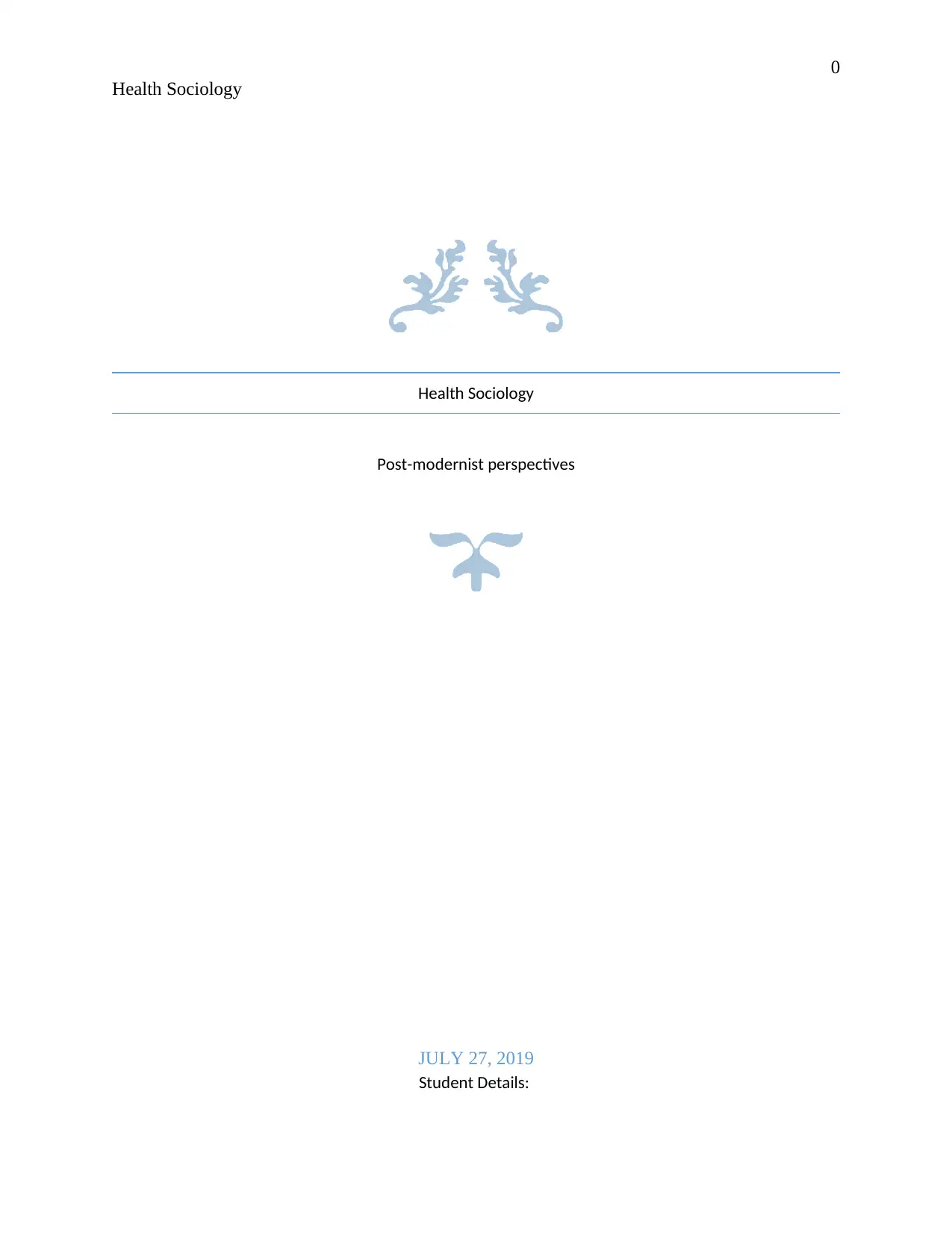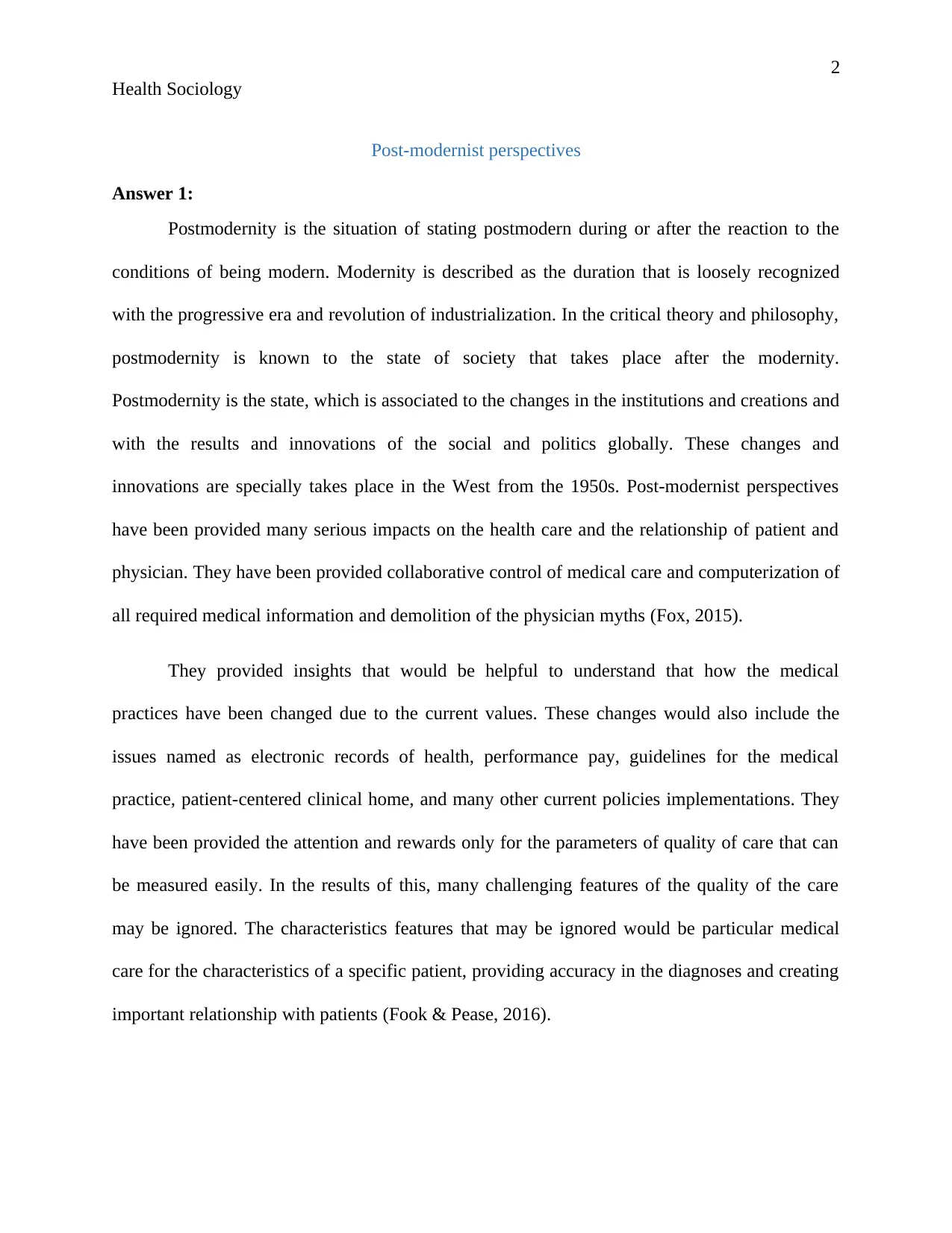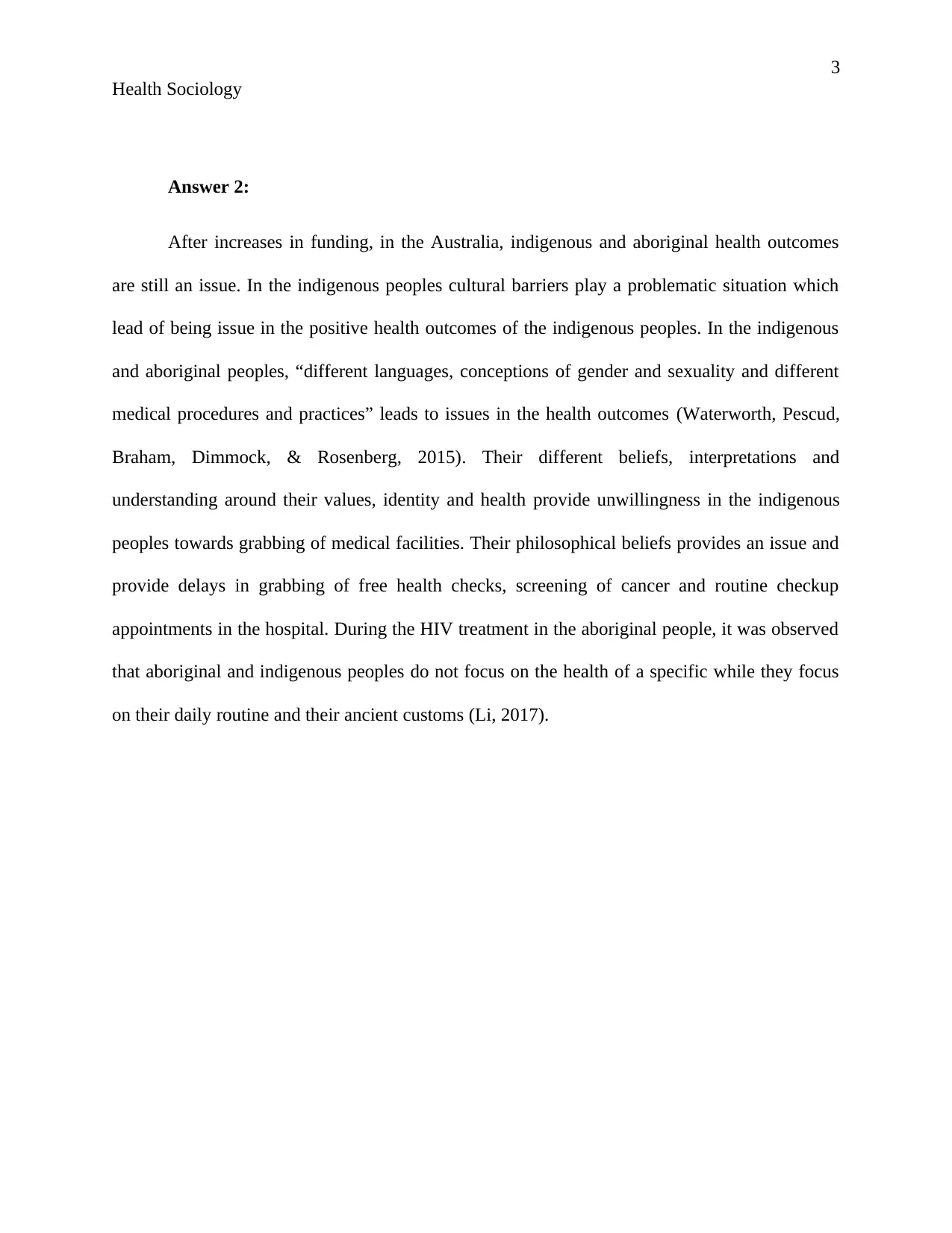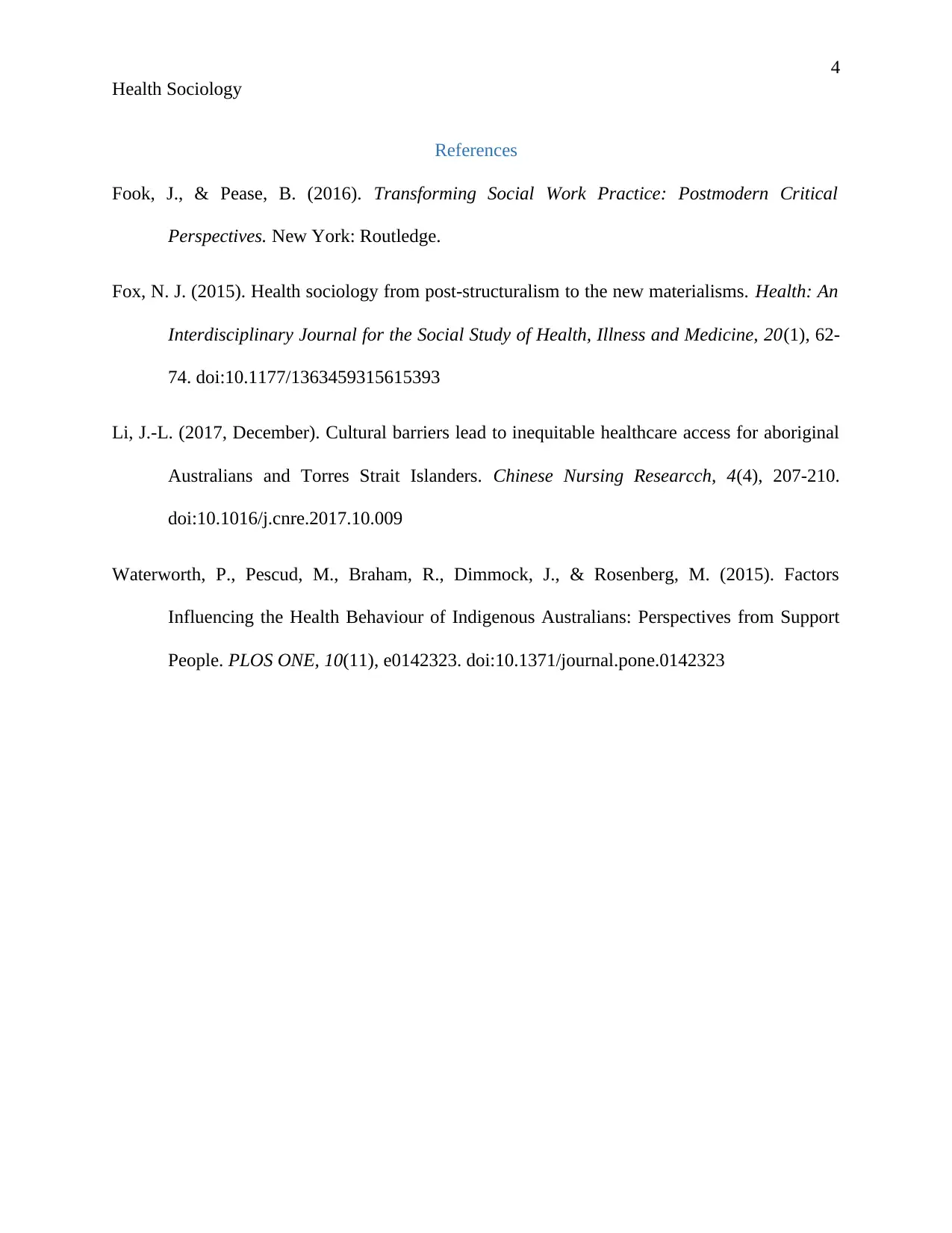Health Sociology Assignment: Post-modernist Perspectives Analysis
VerifiedAdded on 2022/10/17
|5
|665
|8
Homework Assignment
AI Summary
This assignment explores post-modernist perspectives within health sociology, examining their impact on healthcare practices and the patient-physician relationship. It delves into how post-modernist viewpoints have influenced medical care, including the role of technology like electronic health records, performance-based pay, and patient-centered care. The assignment also addresses the challenges faced by indigenous and aboriginal populations in accessing healthcare, highlighting cultural barriers and their effects on health outcomes. The solution references key studies to support its arguments, providing a comprehensive analysis of the topic.

0
Health Sociology
Health Sociology
Post-modernist perspectives
JULY 27, 2019
Student Details:
Health Sociology
Health Sociology
Post-modernist perspectives
JULY 27, 2019
Student Details:
Paraphrase This Document
Need a fresh take? Get an instant paraphrase of this document with our AI Paraphraser

1
Health Sociology
Contents
Post-modernist perspectives............................................................................................................2
References........................................................................................................................................4
Health Sociology
Contents
Post-modernist perspectives............................................................................................................2
References........................................................................................................................................4

2
Health Sociology
Post-modernist perspectives
Answer 1:
Postmodernity is the situation of stating postmodern during or after the reaction to the
conditions of being modern. Modernity is described as the duration that is loosely recognized
with the progressive era and revolution of industrialization. In the critical theory and philosophy,
postmodernity is known to the state of society that takes place after the modernity.
Postmodernity is the state, which is associated to the changes in the institutions and creations and
with the results and innovations of the social and politics globally. These changes and
innovations are specially takes place in the West from the 1950s. Post-modernist perspectives
have been provided many serious impacts on the health care and the relationship of patient and
physician. They have been provided collaborative control of medical care and computerization of
all required medical information and demolition of the physician myths (Fox, 2015).
They provided insights that would be helpful to understand that how the medical
practices have been changed due to the current values. These changes would also include the
issues named as electronic records of health, performance pay, guidelines for the medical
practice, patient-centered clinical home, and many other current policies implementations. They
have been provided the attention and rewards only for the parameters of quality of care that can
be measured easily. In the results of this, many challenging features of the quality of the care
may be ignored. The characteristics features that may be ignored would be particular medical
care for the characteristics of a specific patient, providing accuracy in the diagnoses and creating
important relationship with patients (Fook & Pease, 2016).
Health Sociology
Post-modernist perspectives
Answer 1:
Postmodernity is the situation of stating postmodern during or after the reaction to the
conditions of being modern. Modernity is described as the duration that is loosely recognized
with the progressive era and revolution of industrialization. In the critical theory and philosophy,
postmodernity is known to the state of society that takes place after the modernity.
Postmodernity is the state, which is associated to the changes in the institutions and creations and
with the results and innovations of the social and politics globally. These changes and
innovations are specially takes place in the West from the 1950s. Post-modernist perspectives
have been provided many serious impacts on the health care and the relationship of patient and
physician. They have been provided collaborative control of medical care and computerization of
all required medical information and demolition of the physician myths (Fox, 2015).
They provided insights that would be helpful to understand that how the medical
practices have been changed due to the current values. These changes would also include the
issues named as electronic records of health, performance pay, guidelines for the medical
practice, patient-centered clinical home, and many other current policies implementations. They
have been provided the attention and rewards only for the parameters of quality of care that can
be measured easily. In the results of this, many challenging features of the quality of the care
may be ignored. The characteristics features that may be ignored would be particular medical
care for the characteristics of a specific patient, providing accuracy in the diagnoses and creating
important relationship with patients (Fook & Pease, 2016).
⊘ This is a preview!⊘
Do you want full access?
Subscribe today to unlock all pages.

Trusted by 1+ million students worldwide

3
Health Sociology
Answer 2:
After increases in funding, in the Australia, indigenous and aboriginal health outcomes
are still an issue. In the indigenous peoples cultural barriers play a problematic situation which
lead of being issue in the positive health outcomes of the indigenous peoples. In the indigenous
and aboriginal peoples, “different languages, conceptions of gender and sexuality and different
medical procedures and practices” leads to issues in the health outcomes (Waterworth, Pescud,
Braham, Dimmock, & Rosenberg, 2015). Their different beliefs, interpretations and
understanding around their values, identity and health provide unwillingness in the indigenous
peoples towards grabbing of medical facilities. Their philosophical beliefs provides an issue and
provide delays in grabbing of free health checks, screening of cancer and routine checkup
appointments in the hospital. During the HIV treatment in the aboriginal people, it was observed
that aboriginal and indigenous peoples do not focus on the health of a specific while they focus
on their daily routine and their ancient customs (Li, 2017).
Health Sociology
Answer 2:
After increases in funding, in the Australia, indigenous and aboriginal health outcomes
are still an issue. In the indigenous peoples cultural barriers play a problematic situation which
lead of being issue in the positive health outcomes of the indigenous peoples. In the indigenous
and aboriginal peoples, “different languages, conceptions of gender and sexuality and different
medical procedures and practices” leads to issues in the health outcomes (Waterworth, Pescud,
Braham, Dimmock, & Rosenberg, 2015). Their different beliefs, interpretations and
understanding around their values, identity and health provide unwillingness in the indigenous
peoples towards grabbing of medical facilities. Their philosophical beliefs provides an issue and
provide delays in grabbing of free health checks, screening of cancer and routine checkup
appointments in the hospital. During the HIV treatment in the aboriginal people, it was observed
that aboriginal and indigenous peoples do not focus on the health of a specific while they focus
on their daily routine and their ancient customs (Li, 2017).
Paraphrase This Document
Need a fresh take? Get an instant paraphrase of this document with our AI Paraphraser

4
Health Sociology
References
Fook, J., & Pease, B. (2016). Transforming Social Work Practice: Postmodern Critical
Perspectives. New York: Routledge.
Fox, N. J. (2015). Health sociology from post-structuralism to the new materialisms. Health: An
Interdisciplinary Journal for the Social Study of Health, Illness and Medicine, 20(1), 62-
74. doi:10.1177/1363459315615393
Li, J.-L. (2017, December). Cultural barriers lead to inequitable healthcare access for aboriginal
Australians and Torres Strait Islanders. Chinese Nursing Researcch, 4(4), 207-210.
doi:10.1016/j.cnre.2017.10.009
Waterworth, P., Pescud, M., Braham, R., Dimmock, J., & Rosenberg, M. (2015). Factors
Influencing the Health Behaviour of Indigenous Australians: Perspectives from Support
People. PLOS ONE, 10(11), e0142323. doi:10.1371/journal.pone.0142323
Health Sociology
References
Fook, J., & Pease, B. (2016). Transforming Social Work Practice: Postmodern Critical
Perspectives. New York: Routledge.
Fox, N. J. (2015). Health sociology from post-structuralism to the new materialisms. Health: An
Interdisciplinary Journal for the Social Study of Health, Illness and Medicine, 20(1), 62-
74. doi:10.1177/1363459315615393
Li, J.-L. (2017, December). Cultural barriers lead to inequitable healthcare access for aboriginal
Australians and Torres Strait Islanders. Chinese Nursing Researcch, 4(4), 207-210.
doi:10.1016/j.cnre.2017.10.009
Waterworth, P., Pescud, M., Braham, R., Dimmock, J., & Rosenberg, M. (2015). Factors
Influencing the Health Behaviour of Indigenous Australians: Perspectives from Support
People. PLOS ONE, 10(11), e0142323. doi:10.1371/journal.pone.0142323
1 out of 5
Related Documents
Your All-in-One AI-Powered Toolkit for Academic Success.
+13062052269
info@desklib.com
Available 24*7 on WhatsApp / Email
![[object Object]](/_next/static/media/star-bottom.7253800d.svg)
Unlock your academic potential
Copyright © 2020–2025 A2Z Services. All Rights Reserved. Developed and managed by ZUCOL.





